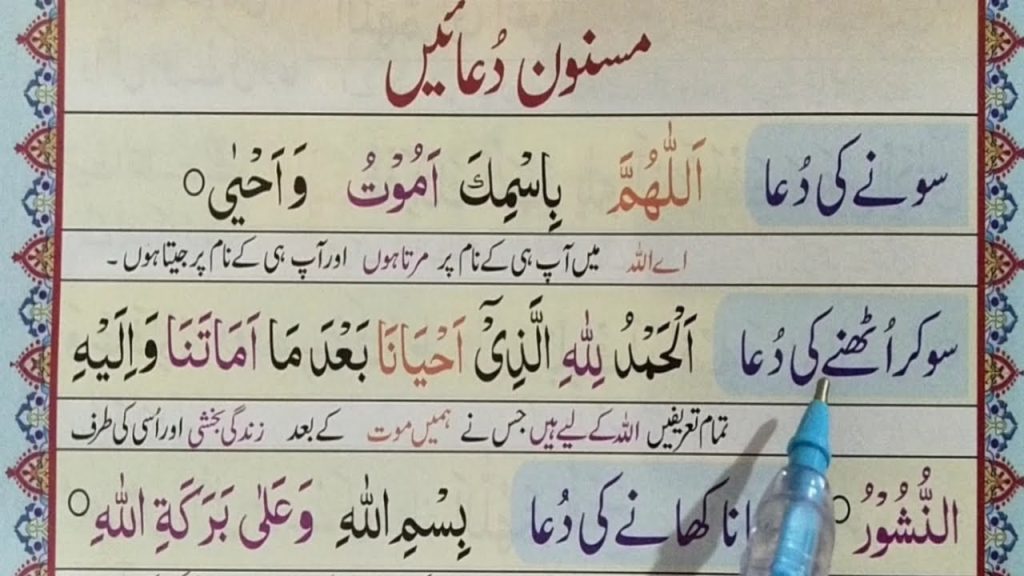Introduction
Begin with a morning dua (so kar uthne ki dua), relatable hook—something like waking up to the sound of birds, the first light of dawn, and how the first words we say can shape our day.
Mention the beauty of remembering Allah from the moment we open our eyes

so kar uthne ki dua in (Urdu):
“تمام تعریفیں اللہ کے لیے ہیں جس نے ہمیں موت کے بعد زندگی دی، اور اسی کی طرف دوبارہ اٹھنا ہے۔”
so kar uthne ki dua (in Arabic):
ٱلْـحَمْدُ لِلَّهِ ٱلَّذِي أَحْيَانَا بَعْدَ مَا أَمَاتَنَا وَإِلَيْهِ ٱلنُّشُورُ
so kar uthne ki dua in English:
“All praise is for Allah who gave us life after causing us to die, and to Him is the resurrection.”
So Kar Uthne Ki Dua mp3
subha uthne ki dua
عربی:
الْحَمْدُ لِلَّهِ الَّذِي أَحْيَانَا بَعْدَ مَا أَمَاتَنَا وَإِلَيْهِ النُّشُورُ
اردو ترجمہ:
تمام تعریفیں اللہ کے لیے ہیں، جس نے ہمیں موت (یعنی نیند) کے بعد زندہ کیا، اور اسی کی طرف لوٹ کر جانا ہے۔
انگریزی ترجمہ:
All praise is for Allah who gave us life after having caused us to die (sleep), and to Him is the resurrection.
یہ دعا نبی کریم ﷺ سے ثابت ہے اور صبح آنکھ کھلتے ہی پڑھی جاتی ہے تاکہ دن کا آغاز شکر، ذکر، اور اللہ کی یاد سے ہو۔
اگر آپ چاہیں، تو میں اس دعا کا ایک خوبصورت کارڈ یا وال پیپر بھی بنا سکتا ہوں جو آپ اپنے فون یا کمرے میں لگا سکیں۔ کیا آپ چاہیں گے؟
The Authentic Dua for Waking Up (So kar Uthne Ki Dua)
Include the original Arabic, transliteration, and meaning in Hindi/English:
Arabic:
الْحَمْدُ لِلَّهِ الَّذِي أَحْيَانَا بَعْدَ مَا أَمَاتَنَا وَإِلَيْهِ النُّشُورُ
Transliteration:
Alhamdu lillahil-ladhi ahyana ba’da ma amatana wa ilaihin-nushoor.
Meaning (Hindi):
“सब प्रशंसा उस अल्लाह के लिए है जिसने हमें मृत्यु के बाद जीवन दिया, और उसी की ओर लौटना है।”

Spiritual Meaning Behind the Dua
- Explanation of “ba’da ma amatana” (after death) as metaphor for sleep
- Reflections on temporary death and Allah’s mercy in returning the soul
- Linking it with the concept of resurrection and accountability
Benefits of Reciting This Dua (so kar uthne ki dua) Daily
- Strengthens tawakkul (trust in Allah)
- Begins the day with gratitude
- Keeps the heart spiritually connected
- Can help combat anxiety or negative energy in the morning
The Sunnah Way of Waking Up ( so kar uthne ki dua)
- Sleeping on the right side
- Wiping the face with hands upon waking
- Saying this dua before speaking
- Brushing teeth (miswak) and doing wudhu (ablution)
Teaching Children the Morning Dua(so kar uthne ki dua)
- Fun and gentle ways to introduce it to kids
- Using rhymes, repetition, or charts
- Benefits of starting these habits early
Related Morning Adhkar (Remembrances)
- Other short du’as to recite after waking
- Morning adhkar from Hadith (like “Asbahna wa asbahal mulku lillah…”)
- Creating a spiritual morning routine

Practical Tips to Remember the Dua
- Writing it on a sticky note near the bed
- Saving it as the phone’s lock screen
- Listening to it daily for memorization
- Using Islamic reminder apps
Psychological & Emotional Impact
- How starting the day with positive words affects the mind
- Reduces stress and increases focus
- Builds emotional resilience with spiritual grounding
A Daily Habit with Everlasting Rewards
End the article by tying back to the idea that a simple line can shift our entire mindset for the day.
Encourage readers to begin this beautiful habit and pass it on to loved ones.
Benefits of Reciting the Morning Supplication (So Kar Uthne Ki Dua)
Islam has blessed us with a collection of Prophetic supplications (Masnoon Du‘āʼ), and the short prayer upon waking is one of the most impactful. By beginning the day with “Alḥamdu lillāhilladhī aḥyānā baʿda mā amātānā wa ilayhin-nushūr”, we consciously invite Allah’s mercy and protection into every moment that follows. This simple act of remembrance reminds us that sleep is like a temporary rest for the soul, granted by Allah, and that every new dawn is a gift.
While the Prophetic prayers are not obligatory for daily actions, choosing to recite the morning supplication demonstrates our devotion and mindfulness. In just a few easily memorized words, we express gratitude for life, acknowledge Allah’s power over life and death, and renew our trust in Him. This practice not only earns immense rewards from Allah SWT but also centers our hearts, lifts our spirits, and sets a blessed tone for the rest of the day.
Frequently Asked Questions (FAQs)
Q1: What is the dua to recite after waking up?
The dua to say upon waking is:
“Alhamdu lillahil-ladhi ahyana ba’da ma amatana wa ilaihin-nushoor.”
It means: “All praise is for Allah who gave us life after He caused us to die, and to Him is the return.”
Q2: Is reciting this dua a Sunnah?
Yes, this dua is from the Sunnah. Prophet Muhammad ﷺ used to recite it upon waking up, beginning his day with gratitude to Allah.
Q3: Can children be taught this dua?
Absolutely! It’s a great way to introduce children to morning remembrance. Teaching it in a fun and simple way helps build a lifelong habit.
Q4: What if I forget to say the dua?
If you forget, recite it as soon as you remember. With regular practice, it becomes second nature.
Q5: Can I recite this dua in English or Hindi first?
Yes, if you’re learning, you can begin with translation or transliteration. The goal is connection and understanding, but try to learn the Arabic slowly over time.

AoA, my name is Abd al-Rahman, and my vision is to spread the knowledge of the Quran to everyone. I am proud and tall while standing as your trusted mentor on the journey of learning and memorizing the Holy Quran. I, along with a committed team of Islamic teachers, am bound to provide an easy online facility for Islamic studies and Hifz programs.

